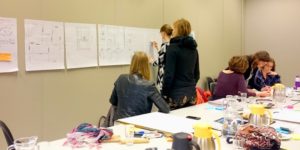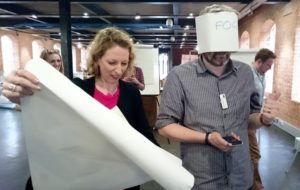Are you wondering whether you could do something interesting with games in your organisation, but not sure where to start?

It wouldn’t be surprising, play is a fundamental part of human nature, games can provide deep engagement, and they are hugely popular (over 70% of the British population play games, for example, mostly on their mobile phones). But creating a good game requires an understanding of how they work and the effect of game mechanics on the players. They can be difficult to get right, particularly for games with a learning intention – the balance of play and education is a tricky one.
“I was really impressed by the way we managed to create our own games at the end of the session – this was really inspiring.” – workshop attendee
My workshop will introduce you the potential range of games and games mechanics, both competitive and collaborative (if you think games are just about shooting zombies, be prepared to think again!). It will look at what makes a successful game, and which game mechanics might be most suitable to achieve you and your organisation or company’s aims. We will also go through the process of designing and testing out a game, so you can see the principles in action. The day is packed with learnings you can use and examples to share with colleagues afterwards, but will also be fun to take part in.
It is usually best run over a good 4-5 hours, but can be compressed. I have run it within institutions, tailored to a particular project, and have also done it as an open ticketed event at Derby Silk Mill and at the National Military Museum in the Netherlands. Elements of it have been run within university courses for Syracuse and the National School of Film and Television and as a workshop for the British Council. It has been honed over several years and now works really well, with very positive feedback from participants and lots of great game ideas generated.
If you want to talk to me about running a version of this workshop for you, you can contact me using the form at the bottom of this page or @marthasadie.
Who is it for?
This workshop is for you if:
- you are commissioning or thinking about commissioning a game
- you are wondering if games are something your organisation should be getting into
- you might be working with a games agency and want to be more effective and understand their process
- you are skeptical about games, or enthusiastic about their potential
- you are looking for a playful primer for the iterative design process that could be applied to all sorts of interactive projects

Feedback from previous workshops
“I feel I now have the developmental structure in place to start building games from objectives up.” Joe Savage, English Heritage
“it was brilliantly designed and well timed, with a good balance of interactive and instructional elements” “Extremely useful and really energising – I left excited at the thought of gamifying each and every presentation going forward (which was the point right?)” “Such a great session! It was really fun and she was really engaging. I liked the session as it was as it was a good mix of learning, playing and designing.” M&C Saatchi World Service participants
“I’d say you learn a lot while having lots of fun. Great if you want to understand more about how games work and become a better commissioner of games.” Anonymous participant
“Martha Henson is a talented and engaged communicator who I can highly recommend as a speaker and facilitator. She is a popular guest speaker for my class on digital engagement, and is outstanding at motivating the students and guiding them through a wide range of immersive activities. “ Carol Nahra, Adjunct Professor, Syracuse University London Programme
“Martha provided a very active and thought provoking workshop. The session was well structured to ensure a focus on the dynamics of group learning through game based play. The lightning game design session was great and resulted in ideas that were based firmly around the mechanics of game design. Martha is great at group facilitation and getting people to think outside the box.” – Graham Davies, Digital Programmes Manager, National Museum Wales